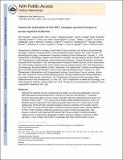| dc.contributor.author | Kentsis, Alex | |
| dc.contributor.author | Reed, Casie | |
| dc.contributor.author | Rice, Kim L. | |
| dc.contributor.author | Sanda, Takaomi | |
| dc.contributor.author | Rodig, Scott J. | |
| dc.contributor.author | Tholouli, Eleni | |
| dc.contributor.author | Christie, Amanda | |
| dc.contributor.author | Valk, Peter J.M. | |
| dc.contributor.author | Delwel, Ruud | |
| dc.contributor.author | Ngo, Vu | |
| dc.contributor.author | Kutok, Jeffery Lorne | |
| dc.contributor.author | Dahlberg, Suzanne E. | |
| dc.contributor.author | Moreau, Lisa A. | |
| dc.contributor.author | Byers, Richard J. | |
| dc.contributor.author | Christensen, James G. | |
| dc.contributor.author | Woude, George Vande | |
| dc.contributor.author | Licht, Jonathan D. | |
| dc.contributor.author | Kung, Andrew L. | |
| dc.contributor.author | Staudt, Louis M. | |
| dc.contributor.author | Look, A. Thomas | |
| dc.date.accessioned | 2013-05-08T19:50:10Z | |
| dc.date.issued | 2012 | |
| dc.identifier.citation | Kentsis, Alex, Casie Reed, Kim L. Rice, Takaomi Sanda, Scott J. Rodig, Eleni Tholouli, Amanda Christie, et al. 2012. Autocrine activation of the MET receptor tyrosine kinase in acute myeloid leukemia. Nature Medicine 18(7): 1118-1122. | en_US |
| dc.identifier.issn | 1078-8956 | en_US |
| dc.identifier.issn | 1078-8956 | en_US |
| dc.identifier.uri | http://nrs.harvard.edu/urn-3:HUL.InstRepos:10612870 | |
| dc.description.abstract | Although the treatment of acute myeloid leukemia (AML) has improved significantly, more than half of all patients develop disease that is refractory to intensive chemotherapy. Functional genomics approaches offer a means to discover specific molecules mediating aberrant growth and survival of cancer cells. Thus, using a loss-of-function RNA interference genomic screen, we identified aberrant expression of the hepatocyte growth factor (HGF) as a critical factor in AML pathogenesis. We found HGF expression leading to autocrine activation of its receptor tyrosine kinase, MET, in nearly half of the AML cell lines and clinical samples studied. Genetic depletion of HGF or MET potently inhibited the growth and survival of HGF-expressing AML cells. However, leukemic cells treated with the specific MET kinase inhibitor crizotinib developed resistance due to compensatory upregulation of HGF expression, leading to restoration of MET signaling. In cases of AML where MET is coactivated with other tyrosine kinases, such as fibroblast growth factor receptor 1 (FGFR1), concomitant inhibition of FGFR1 and MET blocked compensatory HGF upregulation, resulting in sustained logarithmic cell kill both in vitro and in xenograft models in vivo. Our results demonstrate widespread dependence of AML cells on autocrine activation of MET, as well as the importance of compensatory upregulation of HGF expression in maintaining leukemogenic signaling by this receptor. We anticipate that these findings will lead to the design of additional strategies to block adaptive cellular responses that drive compensatory ligand expression as an essential component of the targeted inhibition of oncogenic receptors in human cancers. | en_US |
| dc.language.iso | en_US | en_US |
| dc.publisher | Nature Publishing Group | en_US |
| dc.relation.isversionof | doi:10.1038/nm.2819 | en_US |
| dc.relation.hasversion | http://www.ncbi.nlm.nih.gov/pmc/articles/PMC3438345/pdf/ | en_US |
| dash.license | LAA | |
| dc.title | Autocrine Activation of the MET Receptor Tyrosine Kinase in Acute Myeloid Leukemia | en_US |
| dc.type | Journal Article | en_US |
| dc.description.version | Accepted Manuscript | en_US |
| dc.relation.journal | Nature Medicine | en_US |
| dash.depositing.author | Look, A. Thomas | |
| dc.date.available | 2013-05-08T19:50:10Z | |
| dc.identifier.doi | 10.1038/nm.2819 | * |
| dash.authorsordered | false | |
| dash.contributor.affiliated | Christie, Amanda | |
| dash.contributor.affiliated | Kentsis, Alex | |
| dash.contributor.affiliated | Sanda, Takaomi | |
| dash.contributor.affiliated | Look, A. | |
| dash.contributor.affiliated | Kutok, Jeffery Lorne | |
| dash.contributor.affiliated | Rodig, Scott | |


